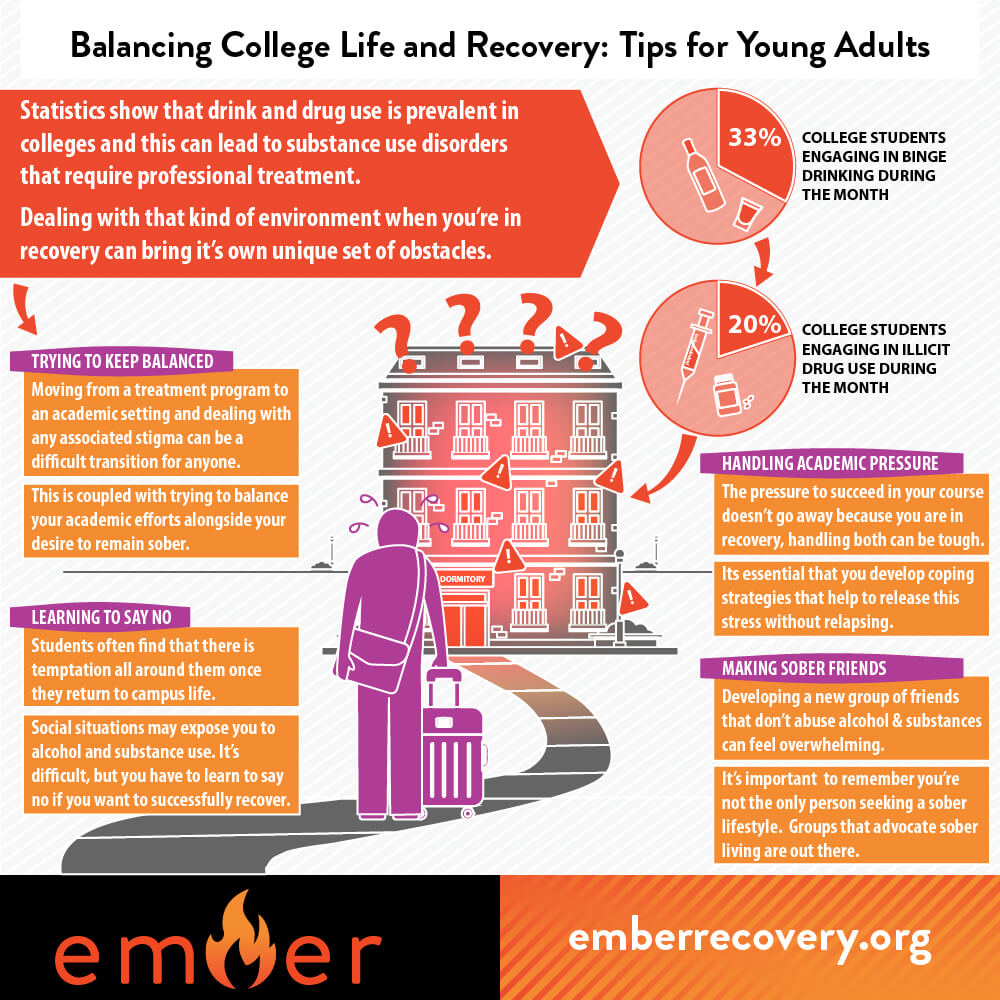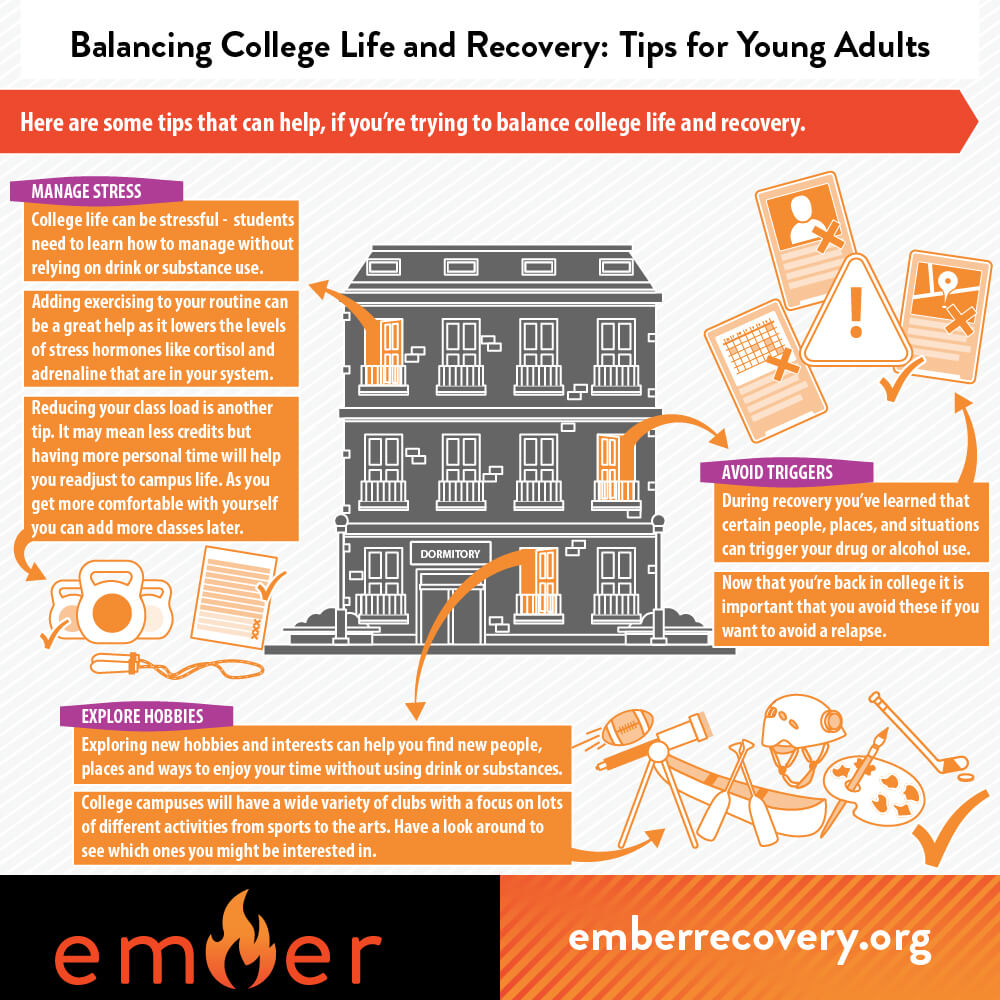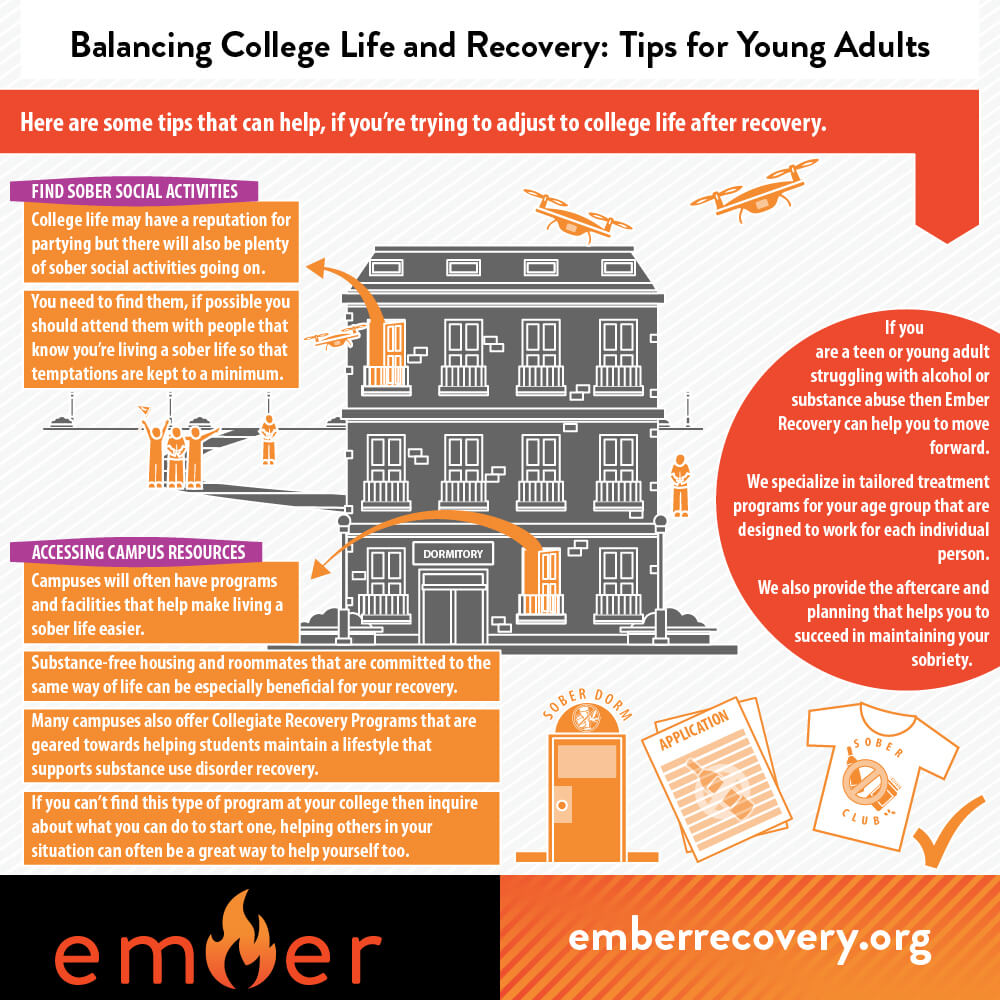Statistics show that more than one-third of full-time college students engage in binge drinking, and about 1 in 5 use an illicit drug during a month’s time. [1].For many, this usage turns into a substance use disorder that requires professional treatment. While college students can excel in their treatment program, the hard work doesn’t stop there. College life and recovery brings its own unique set of challenges. Students must learn how to balance their schoolwork and have a social life while staying committed to their recovery. The staff at Ember Recovery aims to make this easier and has provided several tips for young adults on this path.
Challenges College Students Face During Recovery
During recovery, college students face many challenges as they try to balance their school work and life with their efforts to remain sober. College students must learn how to transition from their treatment programs to an academic setting and develop recovery support near campus. Many students find that they also have to navigate the stigma surrounding substance use disorders.
College students also discover that there are temptations all around them that can try to hinder their recovery. During social settings, students may be offered substances and will need to learn how to say no. While this can be difficult at times, it is necessary for a successful recovery.
Many students also feel pressure to excel in their classes, which can lead them to relapse. Students need to have coping strategies, such as deep breathing exercises or other outlets that can help them manage their pressure.
Trying to make new friends who don’t use substances can also become challenging for many college students in recovery. But many students are living the same lifestyle. Finding groups that support sober living can help to lessen this challenge.
How to Balance College Life and Recovery
Manage Stress
College students need to learn how to manage the stress that can come with college life. One of the ways to do this is to incorporate exercise into their routine. Exercise reduces the levels of the body’s stress hormones, such as cortisol and adrenaline.[2]
Another way to manage stress is to sign up for a manageable class load. This may mean taking fewer credits upon returning to campus life. Allowing yourself to get reacclimated to campus life takes time. As you adjust and feel as though you have things under control, you can add more classes to your schedule.
Avoid Triggers
Knowing the people, places, and situations that can trigger a relapse is key to balancing college life and recovery. Once you can identify these things, avoiding them is important if you want to prevent relapse.
Explore Hobbies
Exploring hobbies can help students find new friends and interests that don’t revolve around substances. College campuses have a wide variety of activities, sports, and clubs that can engage students in meaningful activities.
Find Sober Social Activities
College life has a reputation for parties, but there are also sober social activities. Seeking these out can make college life and recovery more manageable. Be sure that people around you also know that you are living a sober life. This should hopefully prevent them from offering substances that can lead to relapse.
Access Campus Resources
Besides looking for sober social activities, college students should also look for resources on campus that can aid in their sobriety. On some campuses, this can include substance-free housing. If this is not an option, looking for roommates who are also committed to living a substance-free life can be beneficial.
Some campuses may also offer support groups for students in recovery. These can be extremely beneficial, especially for those who may not have groups accessible after their treatment program is over.
Many campuses also offer a Collegiate Recovery Program. This specific program includes a supportive environment within campus life. These programs reinforce the decision to engage in a lifestyle that supports substance use disorder recovery. Asking about these types of programs can help to make the transition easier and provide the necessary help in these situations. If your college or university does not offer these programs, look into what is needed to start one so that you can lead the change to help yourself and others in similar situations.
Seek Substance Use Treatment at Ember Recovery
Ember Recover is here to help teens and young adults achieve sobriety through a variety of treatment programs. We get to know each patient so that we can tailor a treatment program for them. Our residential programs have helped countless young adults battle their substance use disorder and learn how to live a sober life. We also provide aftercare planning to help our patients develop coping strategies to help them succeed in the real world.
For more information on our various services, contact Ember Recovery today to learn more and see that the path to sobriety is only a phone call away.
Sources:
[1] https://www.samhsa.gov/data/sites/default/files/report_2361/ShortReport-2361.html [2] https://www.health.harvard.edu/staying-healthy/exercising-to-relax

Andrea Dickerson is a Licensed Therapist and Certified Substance Use Counselor who has worked in behavioral health since 1997. Currently, Andrea is the Director of Behavioral Health, overseeing the Ember residential treatment programs and YSS outpatient counseling clinics throughout Central and North Central Iowa. She became a Motivational Interviewing (MI) trainer in 2006 and provides MI trainings throughout Iowa.
Andrea specializes in working with adolescents and their families and enjoys seeing the family relationships grow through therapy. Andrea is also a CARF International Surveyor, going around North America ensuring behavioral health organizations are meeting required standards.
In her free time, Andrea enjoys cheering on the Iowa Hawkeyes and Chicago Cubs, as well as being an active member of Soroptimist International of the Americas (SIA), a global organization that provides women and girls with access to the education and training they need to achieve economic empowerment. She has been a member of the SI of Des Moines club since 2012 and has been actively involved at the regional level, currently serving as Co-Governor of the Peaks to Plains Region.
Through her involvement in SIA, Andrea has been actively involved in the Dream Programs, coordinating annual Dream It, Be It: Career Support for Girls projects, which give girls the tools they need to achieve their education and career goals, empowering them to break cycles of poverty, violence, and abuse.



